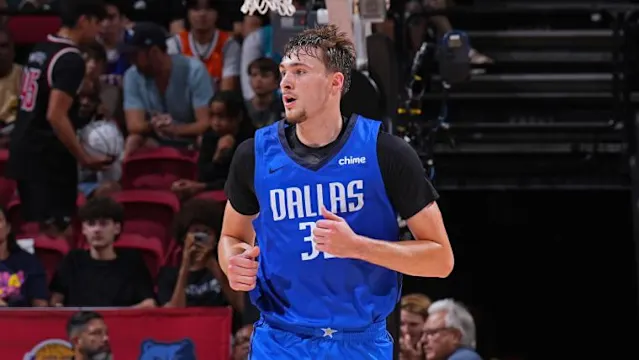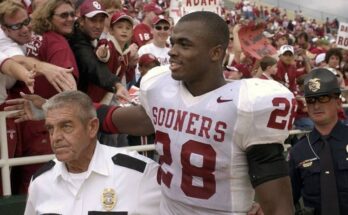How the Mavericks Are Overwhelming Duke Legend Cooper Flagg—and Why They Have Only Themselves to Blame
The Dallas Mavericks found themselves in a challenging situation with one of the brightest young stars in basketball—Cooper Flagg, the Duke University phenom who captured national attention as a generational talent. Yet, as Flagg transitions from college basketball to the professional stage, it’s becoming painfully clear that the Mavericks may be placing too heavy a burden on their rookie, setting him up for more struggle than success. This predicament is not due to a lack of talent or heart from Flagg himself; rather, it stems from the organization’s own missteps in managing his development and integration into the NBA.
Cooper Flagg entered the professional arena with sky-high expectations. As a highly touted recruit, Flagg’s freshman year at Duke was nothing short of spectacular—he dazzled with his blend of length, versatility, and basketball IQ, showing flashes of a future superstar. His all-around skill set made him a standout on a Duke team that went deep into the NCAA Tournament, and his name quickly became synonymous with potential and promise. Naturally, when the Mavericks secured Flagg in the NBA Draft, excitement surged among fans and analysts alike. They saw him as a cornerstone for the franchise’s future, a rare talent capable of transforming the team’s trajectory.
However, the transition from college basketball to the NBA is notoriously difficult, even for players of Flagg’s caliber. The speed of the game increases dramatically, defenses are more sophisticated, and the physicality intensifies. This is where organizations need to play a critical role—nurturing their young talent with patience, measured minutes, and a development plan tailored to help them acclimate to the professional level. Unfortunately, the Mavericks appear to be missing this crucial approach.
Instead of easing Flagg into the rotation and giving him the opportunity to grow gradually, the Mavericks have thrust him into a demanding role, expecting him to carry a significant load from the outset. Whether due to a lack of depth on the roster, high expectations from ownership, or a strategic gamble by the coaching staff, the result has been an overwhelming pressure cooker environment for Flagg. Rather than nurturing his growth with manageable minutes and specific developmental goals, Dallas is effectively asking him to be a finished product immediately—a recipe for frustration and uneven performances.
This situation is exacerbated by the lack of a supportive cast built around Flagg. Successful rookies often thrive when surrounded by experienced veterans who can shoulder responsibility and mentor them through the ups and downs of the NBA grind. But the Mavericks’ roster currently lacks sufficient depth and veteran presence, forcing Flagg into situations where he has to compensate for teammates’ deficiencies instead of focusing on his own growth. The weight of expectation is compounded by the absence of reliable secondary scoring options or defensive stalwarts, which places even more responsibility on Flagg’s shoulders.
Moreover, the Mavericks’ coaching philosophy appears somewhat rigid and unadaptable to the needs of a rookie like Flagg. NBA coaching at the developmental stage requires flexibility—allowing young players to experiment, make mistakes, and gradually build confidence without fear of immediate consequences. Unfortunately, the current setup seems to emphasize results over process, with Flagg’s minutes and responsibilities tied directly to win-or-lose outcomes. This high-stakes approach stifles experimentation and learning, critical for a young player still finding his footing in the league.
From Flagg’s perspective, this is a difficult scenario. The young star’s talent and work ethic are unquestioned, but the mounting pressure and expectation can weigh heavily on confidence and performance. As mistakes pile up, frustration grows, and questions arise in the media and among fans, it becomes easy to misinterpret these struggles as personal shortcomings rather than a systemic failure of support and development. The Mavericks must recognize that placing a rookie in such a taxing role without the proper scaffolding can derail even the most promising careers.
In contrast, many successful NBA franchises have learned the value of patience with their young stars. Teams like the Golden State Warriors with Stephen Curry, the Milwaukee Bucks with Giannis Antetokounmpo, and the Miami Heat with Bam Adebayo allowed their young talents to develop incrementally. They provided structured environments, adequate rest, and role clarity, ensuring these players didn’t bear the full burden too soon. The Mavericks would do well to adopt a similar philosophy with Flagg, prioritizing his long-term development over short-term results.
It’s important to note that the Mavericks are not alone in facing challenges with rookie development, but their current handling of Flagg stands out because of the player’s immense potential. Flagg’s unique skill set—his defensive versatility, ability to handle the ball, and high basketball IQ—makes him a potential franchise-changing player. But maximizing that potential requires the right environment, which the Mavericks have yet to fully provide.
Additionally, the pressure to deliver immediate results in a highly competitive Western Conference can lead to impatience with young players. The Mavericks are eager to reclaim their status as title contenders and may view Flagg as a key piece in that puzzle right now. However, rushing his development and placing too many responsibilities on him too soon risks backfiring. The better strategy is a measured approach, allowing him to build confidence and adjust gradually to the rigors of the NBA.
Fan expectations also play a role in this dynamic. The excitement around Flagg’s arrival brought intense scrutiny, and every misstep is magnified. While understandable, this kind of pressure is often counterproductive for rookie players. The Mavericks’ management, coaching staff, and veteran players should collectively shield Flagg from undue criticism and foster an environment of support and encouragement.
In the end, the Mavericks have created a situation where Cooper Flagg faces more challenges than necessary in his rookie year, and that is a problem of their own making. They hold the keys to either enabling his growth or inadvertently hindering it. With thoughtful management, patience, and a willingness to adapt their approach, Dallas can nurture Flagg into the star they envisioned when they drafted him. Without those changes, they risk squandering a rare talent on the altar of unrealistic expectations and mismanagement.
For Cooper Flagg’s sake and the future of the Mavericks franchise, it’s crucial that the organization recognizes where it has fallen short and commits to a development plan that prioritizes the player’s long-term success. Only by doing so can they hope to unlock the true potential of one of the most promising young players to enter the league in recent years.



